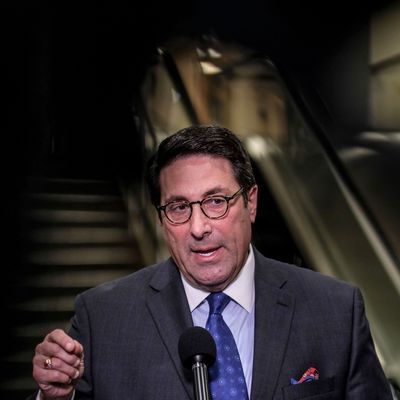
Tuesday’s abbreviated session for hearing the conclusion of the arguments made on the president’s behalf by his team of public and private-sector lawyers produced no bombshells or even minor revelations. It did reflect an apparent decision by Team Trump to shift from their initial “he never did anything wrong!” posture to “So what if he did?” Continuing Alan Dershowitz’s argument from yesterday, the president’s attorneys mostly relied on the claim that nothing even alleged in the House record rose to the level of impeachable offenses, as evidenced by the absence of bipartisan support for the whole exercise. Jay Sekulow pounded this point home, per the Washington Post:
“The bar for impeachment cannot be set this low,” he said. “Danger, danger, danger. These articles must be rejected. The Constitution requires it. Justice demands it.”
Earlier, Sekulow argued that the abuse of power charge “fails constitutionally.”
“The president has constitutional authority to engage, conduct foreign policy and foreign affairs,” he said. “It is our position, legally, the president at all times acted with perfect legal authority, inquired of matters in our national interest.”
In other words, even if Trump’s infamous call to Vlodymyr Zelensky wasn’t “perfect,” his constitutional right to conduct it as he saw fit actually was.
This apparent strategic shift was almost certainly in response to the threat of new testimony (or barring that, eventual revelations) from John Bolton. Even if he establishes that Trump was trying to influence Zelensky to “do him a favor” involving a “quid-pro-quo,” Trump’s defenders are making it clear it’s just not enough to justify his removal from office. The effort to get as far away from discussion of the facts of the president’s conduct was evidenced by the argument’s conclusion, which consisted of video of today’s House and Senate Democrats arguing against the impeachment and removal from office of Bill Clinton as excessively lowering the standard for this dramatic act.
It’s unclear whether the president will be happy with this less-than-total defense or if anyone will suddenly decide Trump is a victim of partisanship thanks to two-decades-old tapes of Democrats fighting for Clinton. But it does provide a good fallback position in case Bolton testifies or his book leaks into the public domain.
The continuing drama over Democrats’ efforts to secure four Republican votes to issue a subpoena to Bolton continued without much if any news. Writing at Intelligencer, Ben Jacobs thinks the momentum for the potential breakthrough has stalled:
Though the national security adviser’s account still dominated the news cycle, North Carolina Representative Mark Meadows, a close Trump ally, banked on the frenetic pace of contemporary politics to blow the story over by Monday. “It’s the reality of Washington, D.C.,” he said. “We’re on a 24- and 48-hour news cycle and candidly there’s a lot of news each and every day. To suggest that we put a lot of emphasis on one report from the New York Times would be to ignore history where we have not only news that breaks every day, but allegations that break every day that seem blockbuster at the time they are made, but yet, when they are vetted, don’t pass muster.” It remains to be seen if the reporting on Bolton’s book will “pass muster,” but the bet seems to be that it will fade into the ether regardless.
There was another Bolton idea floating around today, from Senate Republicans, as Politico reported:
[O]ne last-minute proposal from Sen. James Lankford (R-Okla.) — backed Tuesday by Sen. Lindsey Graham (R-S.C.) — [was] to obtain and review a copy of the book in a classified setting. Schumer quickly rejected the proposal as “absurd,” saying a book should not need to be kept in a secure facility and calling it an effort to deflect from Democrats’ demand to call witnesses.
Tuesday’s quick adjournment gave Democratic presidential candidates a providential opportunity to get themselves to Iowa, if they can secure transportation. But it also gave Republicans the change to gather, compare notes, count noses, and decide if they’re sure they have the votes to deny witnesses and end the trial with the expected dispatch. The next two days will be absorbed with the slow ritual of senators posing questions to the contending attorneys by written note (coordinated by the party leaders, and alternating in sequence), the practice set out in the standing Senate rules and also followed in the Clinton trial, as Adam Keiper recalls:
Each side in the Clinton impeachment trial presented its case over three days. Then, on January 21 and 22, 1999, the House managers and the Clinton defense team took questions from the senators. These questions were handwritten on slips of paper that were hand-delivered to Chief Justice Rehnquist, who then read them aloud.
Although it seemed like the questions might really have been coming from the senators, in fact, much of the questioning was scripted.
Assuming the Senate can dispose of the planned 16 hours of questions in two days, then the big vote on witnesses will occur Friday. In theory, if the vote goes Republicans’ way, the verdict on Trump’s removal (which everyone understands will acquit him) could happen on Saturday, and then Trump can strut his triumphant stuff at Tuesday’s scheduled State of the Union Address, even as Democrats mull the results of the Iowa Caucuses and their consequences for the contest to identify a 46th president.






























